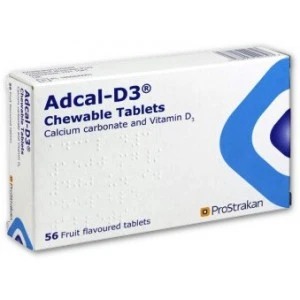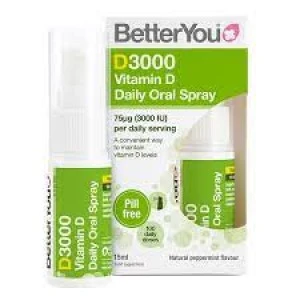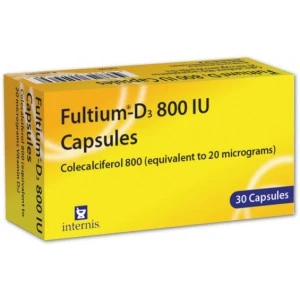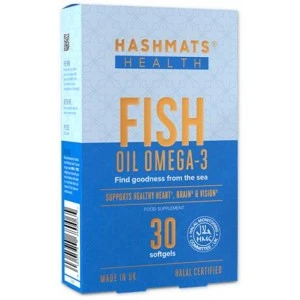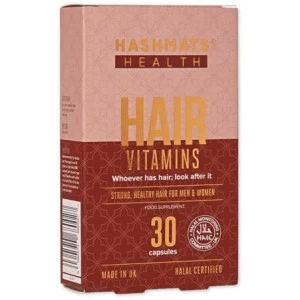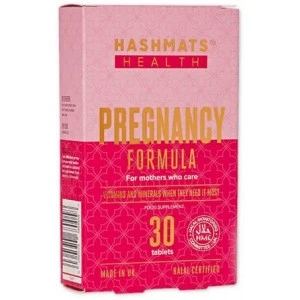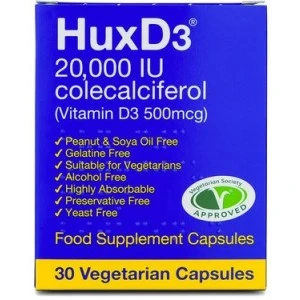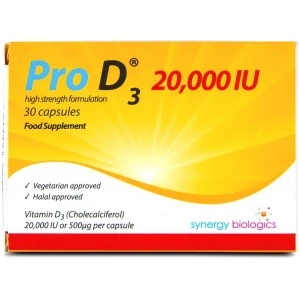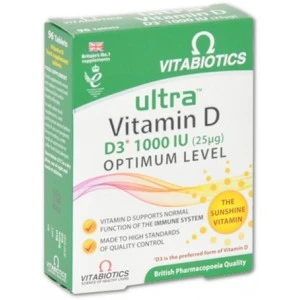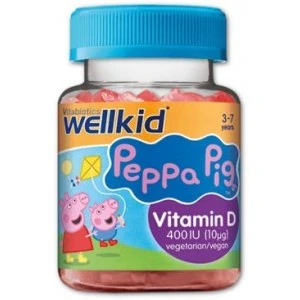Vitamin supplements
Vitamins are essential molecules that support our bodies in various ways. Scroll down to see our range of vitamin supplements.
Adcal D3
- Increases vitamin D
- Contains calcium
- Available in chewable tablets
DLux 3000 Oral Spray
- Easy to take
- Increases vitamin D
- No prescription required
Fultium D3
- High-strength supplement
- Easy-to-swallow capsules
- Available from a UK-based pharmacy
Hashmats A-Z Multivitamins
- Halal certified
- Suitable for vegetarians
- Complete multivitamin containing 33 bio-elements
Hashmats Fish Oil Omega-3
- Certified Halal
- Source of Omega-3
- Available from a UK-registered pharmacy
Hashmats Hair Vitamins
- Halal certified
- Protects hair and nails
- Available from a UK-registered pharmacy
Hashmats Kids Multivitamins
- Suitable for children aged 4+
- Certified Halal and vegetarian
- Available from our UK-registered pharmacy
Hashmats Pregnancy Formula
- Halal certified
- suitable for vegetarians
- Source of folic acid and vitamin D
Hashmats Vit-D3
- Source of Vitamin D
- Halal certified
- Available for next-day delivery
HuxD3 Capsules
- High strength
- No prescription required
- Suitable for vegetarians
Metatone Tonic
- Provide gentle boost
- During and after illness
- Help restore health & vitality
Pro D3
- Tops up vitamin D
- Suitable for vegetarians
- Available without prescription
Valupak D3
- Raises vitamin D
- Promotes bone health
- Available without a prescription
Vitabiotics Ultra Vitamin D
- Well-known brand
- One-a-day tablet
- Available without prescription
WellKid Vitamin D Soft Jellies
- Strawberry flavour
- Chewable vitamin
- Free from preservatives
What are Vitamins?
Vitamins are organic compounds which provide a range of functions in the body, including the growth and development of muscles and bones.
There are 13 vitamins:
- A
- C
- D
- E
- K
- B1 (Thiamin)
- B2 (Riboflavin)
- B3 (Niacin)
- B5 (Pantothenic acid)
- B6
- B7 (Biotin)
- B9 (Folate)
- B12 (Cyanocobalamin)
With the exception of vitamin D, the body cannot make vitamins itself, so we rely on our diet to provide the right amount of vitamins. Eating a varied and balanced diet is an effective way to obtain nearly all the vitamins we need to maintain good health.
Vitamin D is the only vitamin which our body makes itself. When exposed to UVB radiation from the sun, cells in the skin called keratinocytes convert 7-DHC (dehydrocholesterol) into the pre-vitamin D3.
Each vitamin plays a different role in the body. For example, vitamin C is well known for its role in treating scurvy, a condition caused by a deficiency of vitamin C. Vitamin B12 is used by cells throughout the human body, aiding in the production of DNA and catalysing enzymatic reactions (speeding up reactions in the body).
Who should take vitamin supplements?
Most people do not need to take vitamin supplements, so long as they are eating a healthy and balanced diet.
However, some vitamin supplements are recommended for individuals with specific vitamin deficiencies or certain medical conditions.
The NHS recommend that children aged between 6 months and 5 years take a daily multi-vitamin supplement. For advice on whether your child should take a vitamin supplement, speak to your doctor.
Public Health England (PHE) advises people to take vitamin D supplements during the months between October and March. Due to the dwindling sunlight during the colder months, the body produces less vitamin D than it does during the spring and summer months.
Strict vegetarians and vegans are often advised to take vitamin B12 supplements. Vitamin B12 can prevent anaemia, eye diseases and osteoporosis.
Women who are pregnant or trying to conceive are recommended to take 400 mcg of folic acid. According to the NHS, you should start taking it before you stop using contraception. Folic acid is crucial while your child is developing and can reduce the chance of neural tube defects, such as spina bifida. It's always best to speak to your doctor before taking any health supplements if you are pregnant or plan on becoming pregnant.
If you are unsure whether to take vitamin supplements, consult your doctor. Depending on your diet and lifestyle, you may benefit from taking a vitamin supplement. For example, individuals who follow a vegan diet are at a higher risk of developing a vitamin B12 deficiency; therefore, they should consider taking a vitamin B12 supplement.
While not strictly classified as vitamins, other mineral supplements, such as zinc, calcium, and iron, may also be beneficial when combined with a healthy and balanced diet. Some foods are fortified with these metals, which means they have added minerals.
Always consult your doctor before taking vitamin and mineral supplements.
How do I know if I have a vitamin deficiency?
A vitamin deficiency is a lack of vitamins which the body needs to function normally. In many cases, the deficiency is caused by a diet lacking in a specific food group. Contrarily, deficiencies can be caused by malabsorption in the body. This occurs when the body is unable to process vitamins effectively, and therefore, they are not absorbed properly.
Different vitamin deficiencies have varying effects on the body. For example, a lack of vitamin C can cause scurvy, resulting in symptoms such as swollen, bleeding gums, weakness and red or blue spots on the shins. A lack of vitamin A can affect vision, making it harder to see in dim light or, in extreme cases, causing permanent blindness.
If you develop any symptoms that may be attributed to a vitamin deficiency, consult your doctor.
Vitamin deficiencies are usually diagnosed with a blood test. You can get vitamin deficiency tests on the NHS. A healthcare professional usually conducts these in a clinic or hospital. A nurse or doctor will collect a blood sample from a vein. According to NICE, vitamin deficiency tests are typically reserved for individuals who present with specific symptoms.
Alternatively, you can buy vitamin deficiency tests privately from online pharmacies and test centres. These tests are usually conducted by yourself at home. They involve collecting a blood sample from your finger using a lancet.
You can discuss your results with a healthcare professional. They will be able to determine whether you need to take a vitamin supplement or make adjustments to your diet and lifestyle.
Types of vitamin supplements
Vitamin supplements are available in various formulations.
Tablets and capsules are the most common form of vitamin supplements. These are usually swallowed whole with water. However, some people may have difficulty swallowing tablets. If you have difficulty swallowing tablets, consult a pharmacist about alternative formulations that may be available.
Some vitamins have chewable variations. These are usually flavoured and are available for both adults and children. Chewable vitamins, particularly those made for children, may contain high amounts of sugar. Always check the label or ask a pharmacist if you are concerned about the amount of sugar in a vitamin supplement.
Effervescent vitamins are a popular formulation as they make it easier to take. These vitamin supplements are dissolved in water to create a drink. Much like chewable tablets, they are often flavoured to make them more palatable. However, effervescent tablets can contain high amounts of salt. If you have been advised to reduce your salt intake, consult your doctor before taking effervescent tablets.
Multivitamins
Aside from individual vitamins, which are often used to treat specific vitamin deficiencies, there are multivitamins which combine several vitamins and minerals into one tablet.
Multivitamins can be marketed in various ways. Some are formulated to boost the health of men and women in different ways. Others may be designed to boost the immune system and keep the body's defences strong. Your doctor may recommend a multi-vitamin during pregnancy or during the winter to ensure your body is getting the right amount of vitamins and minerals.
Different multi-vitamins contain varying amounts of different vitamins. Some may contain more vitamin A or vitamin C. Moreover, multi-vitamins may also contain minerals like iron and zinc.
You can find the list of vitamins and minerals on the packaging. Sometimes, the amount of each vitamin is listed in either international units (IU), milligrams (mg), or micrograms (mcg).
Where can I buy vitamins online?
Generally, most vitamin supplements are available over the counter from pharmacies, health food shops and supermarkets. They may offer different formulations, such as tablets, capsules or liquids.
Before taking any vitamin supplement, it's essential to consult your doctor. Vitamin supplements can interact with other medications you may be taking. Your doctor may be able to recommend specific vitamin supplements tailored to your needs.
Some vitamin supplements, such as Fultium D3, are only available on prescription and are used to treat a diagnosed vitamin deficiency.
Frequently asked questions about vitamins
Should I take a multivitamin every day?
Taking a multivitamin every day is generally considered safe when taken in conjunction with a balanced and nutritious diet.
For the most part, you can obtain most of the vitamins and minerals your body needs through a healthy and balanced diet. However, there are some vitamins which we can't get enough of with diet alone, such as vitamin D.
When is the best time to take vitamins?
While you can take vitamins at any time of day, some vitamins, like B vitamins (B2, B6 and B12), are best taken in the morning.
Can taking vitamins cause weight gain?
It is unlikely that vitamins cause weight gain when taken in conjunction with a healthy and balanced diet.
Which vitamins should I take daily?
Some of the most essential vitamins include vitamin C, vitamin D, calcium, zinc, iron and vitamin B12. Many multivitamins contain these vitamins, though you shouldn't rely on a multivitamin as the main source of these minerals.
What vitamins should I take during pregnancy?
It is recommended to take 400 mcg of folic acid during pregnancy to reduce risks during the first 12 weeks of pregnancy. You should also consider taking vitamin D during pregnancy.
During pregnancy, it is recommended to avoid taking vitamin A, as it can harm your baby.
You should always speak to your doctor or a pharmacist before taking any vitamin supplements during pregnancy.
Do I need a prescription for vitamins?
Some vitamin supplements, particularly high-dose vitamins, are only available on prescription.
Most vitamin supplements are available over the counter from pharmacies, health food shops, supermarkets and online vendors such as Prescription Doctor.
Do children need to take a multivitamin?
Children may benefit from a multivitamin to ensure they are getting their daily recommended intake of vitamins and minerals.
The UK government recommends that children aged between 6 months and 5 years take a vitamin supplement that contains vitamin A, vitamin C, and vitamin D.
Babies who are taking in more than 500ml of formula do not need to take vitamin supplements. This is because formula milk is fortified with vitamins A, C and D.
You should always speak to your doctor or a pharmacist before giving your child a vitamin supplement.
Sources
NHS, 2020. Vitamins and minerals.
NHS, 2021. Vitamins for children.
NHS, 2020. Vitamins, supplements and nutrition in pregnancy.
Authored & Reviewed By

Mohamed Imran Lakhi
MPharm - Lead PharmacistPublished on: 28/09/2020 Reviewed on: 18/05/2021
© 2013 - 2026 Al Muhsineen Limited. All Rights Reserved. Registered Pharmacy: 34 Halliwell Road, Bolton BL1 8RL. Registered Office: 254 First Floor, Shearbrow, Blackburn, England, BB1 8DS

